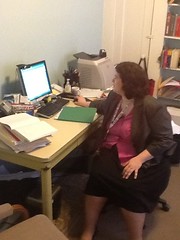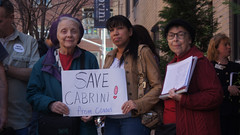A program that serves needy East Village and Lower East Side immigrants is in peril, as a significant chunk of its funding will disappear when its sponsor, the Cabrini Center for Nursing and Rehabilitation, closes next month.
After last-ditch efforts to keep the Cabrini Center open fell through and the new owner of its building at Fifth Street and Avenue B, Benjamin Shaoul’s Magnum Realty Group, announced in March that it would go ahead with redevelopment plans, it became apparent that the nursing home’s 240 residents would be forced to relocate.
Those elderly residents won’t be the only ones affected by the closure on June 30. The Cabrini Center also sponsors Cabrini Immigrant Services, a Lower East Side organization that, according to its director Sister Kelly Carpenter, feeds about 16,000 people a week. City, state, and federal grants totaling $94,000 pay for most of the meals, but the cost of administering them has, to this point, been covered by the center.
The food distribution program isn’t the only thing in jeopardy. According to Javier Ramirez-Baron, the family programs coordinator at Cabrini Immigrant Services, the non-profit’s volunteers teach English to around 130 students throughout the week, and its legal and social service arms help nearly 400 new clients per year with applications for food stamps, passports, and even college.
With the help of a $25,000 donation from The Missionary Sisters of the Sacred Heart of Jesus and $25,000 from the Stella Mars Province, the non-profit will be able to stay afloat at least through the fall. But with its subsequent future uncertain, its staff has added fundraising to its already crowded task list. A working group created to tackle the issues surrounding the Cabrini Center’s closure – made up of board and staff members, including CEO and President Patricia Krasnausky – is aiming to incorporate Cabrini Immigrant Services, and to raise the money required to keep it running for the next year.
“Cabrini Immigrant Services has helped so many individuals and families seeking safety, stability and a productive path during a critical time in their lives,” Ms. Krasnausky said in a statement e-mailed to The Local. “For 13 years, CIS has been a trusted and life-changing resource for immigrants from the Lower East Side and across New York City. However, with the future of CIS now uncertain, we are working to ensure that CIS can continue to serve those in need.”
In the past year, 44 clients obtained green cards and another 27 were nationalized with the organization’s help. “There are not enough legal services for the community,” said Mr. Baron. “The people coming here are working families. They could have been working twenty, fifteen, ten years and paying taxes, but they cannot pay for a lawyer.”
Bolivar De la Maza, a resident of Avenue D who is disabled and has poor eyesight, said there was no other place in the neighborhood that could’ve offered affordable assistance with his U.S. citizenship paperwork. “They really do help you if you need help. Not too many people know about paperwork,” he said. “A lawyer would charge you $700 or $800 at least just for a little paperwork.”
Ms. Kelly recently sent out an appeal letter to supporters in an attempt to raise awareness and solicit donations. Cabrini Immigrant Services has also applied for some discretionary funding, but its director sees that as more of a short-term solution. “There isn’t a lot out there and if we do get some it wouldn’t be enough to fund an entire program,” she said. “It would certainly help.”
She took a cautiously optimistic tone about the future of the non-profit. “We’re open, we’re planning on staying open,” she said. “We’re going to continue and pray that we continue to provide these services.”






